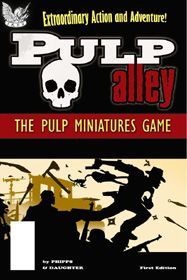Pulp Alley (2012) Board Game
Pulp Alley is a tabletop adventure board game that was released in in 2012. It was designed by Jon Ascher, Luke Parker, Matthew Reynolds, and Matthew Westberg. The game is set in the world of pulp fiction, where players take on the roles of daring adventurers, spies, and secret agents in thrilling missions.
Game Components of Pulp Alley
How To Setup Pulp Alley
Setting up Pulp Alley involves several steps. First, players select their miniatures and the scenario they wish to play. Each scenario outlines the setup, including the terrain, objectives, and any special rules. Players then place their miniatures on the tabletop according to the scenario instructions. Finally, they shuffle and deal the necessary game cards, ensuring each player has the required cards for their characters.
Gameplay Mechanics and Game Objective
Player Experience
Playing Pulp Alley is a dynamic and engaging experience filled with two-fisted action and unexpected twists. The game’s flexibility allows players to create their own stories and settings, making each playthrough unique. The combination of miniatures, terrain, and scenario-driven gameplay ensures a high level of immersion and variety.
Pros
Cons
Personal Thoughts on Pulp Alley
Pulp Alley is ideal for players who enjoy miniatures games, creative storytelling, and versatile gameplay. It is particularly suited for those who appreciate the pulp fiction genre but is adaptable enough to fit into any setting or theme. The game’s ability to accommodate different player counts and play styles makes it a great addition to any tabletop gaming collection. However, it may not be the best fit for players looking for a quick, straightforward game due to its setup and rule complexity.
We are supported by our audience. When you purchase through links on our site, we may earn an affiliate commission, at no extra cost for you. Learn more.

